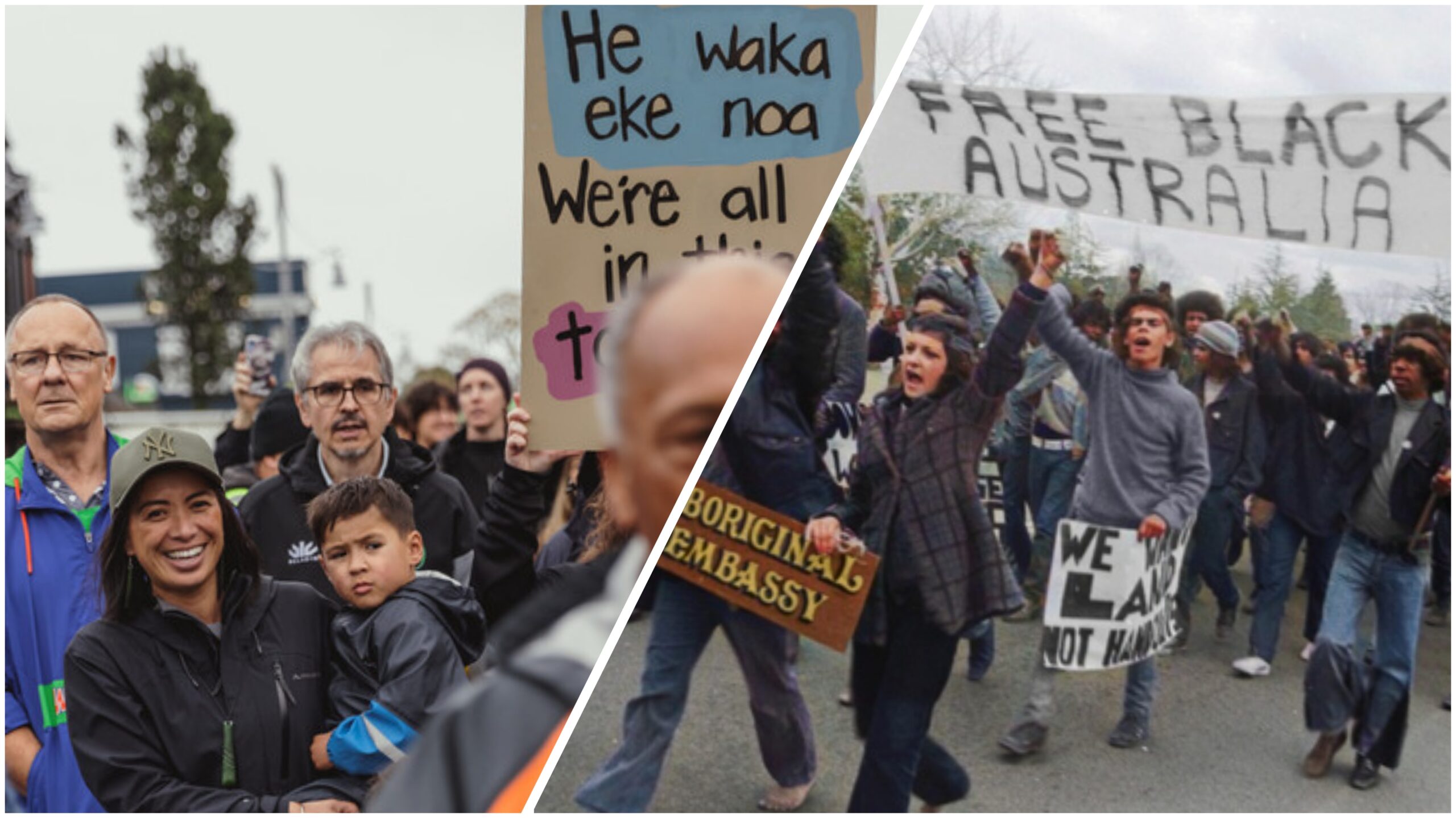For Indigenous people living under settler colonialism, the themes of NO MĀORI ALLOWED (2022) and STILL WE RISE (2022) feel more than familiar. In the former, director Corinna Hunziker (Ngāpuhi, Ngāti Kahu) interviews Māori elders and community members to confront—some for the first time publicly—the acute racial segregation that pervaded Pukekohe, a small township in Aotearoa (New Zealand) during the mid-twentieth century. In the latter, director John Harvey (Saibai Islander) examines the 1972 establishment of the Aboriginal Tent Embassy in front of the Australian Parliament House as a form of resistance to centuries of colonization, a reflection the violence of the white supremacist police state when the Tent Embassy is repeatedly dismantled, and an inspiration for other land rights struggles across the country.
Both films skillfully address overlapping themes of colonialism, racism, state violence, historical denial, and Indigenous resistance and agency. The recognition of these similar struggles across contexts can offer invaluable solidarity between Aboriginal, Māori and even other Indigenous communities. However, it is also critical to acknowledge their distinctions and inevitable divergences. Whereas STILL WE RISE emphasizes the increasing influence of extractive capitalism in the mid-twentieth century, NO MĀORI ALLOWED only gestures to the agricultural industry for context. While the former referred generally to the oppression of Black Australia, the latter highlighted the specificities of racial discrimination in Pukekohe.
Beyond content, both directors also attended to form, using features of Indigenous storytelling. Composed almost entirely of archival footage from movements in the 1970s, interspersed with footage from past decades to situate the present struggle, STILL WE RISE is far from the typical documentary format with interviews and chronological narration. Instead, as with most Indigenous stories, the film’s timeline is not linear, and Harvey shows rather than tells the viewer the violence of colonization and racism, accompanied by engaging graphics and often haunting audio overlays.
In contrast, NO MĀORI ALLOWED has a more classic, interview-based documentary format. However, as characteristic of Indigenous storytelling, a considerable portion of the documentary interrogates the authority of the author, or the positionalities and ethical obligations of each actor in this project. Repeatedly, the film asks, “Who has the right to tell this story?” Is it Robert Bartholomew, the American historian whose 2020 book (on which this documentary is partially based) was published without permission of the Pukekohe elders? Is it Catherine Tamihere, a young Māori teacher who recently moved to Pukekohe and urges elders to share their stories as a means of healing? Or is it Pare Rauwhero, a Māori elder who maintains only mana whenua, those from Pukekohe, had the right to speak on it? In so generously addressing these questions of authority, Hunziker encourages viewers to consider their kuleana (right, privilege, responsibility) in relation to community, and especially to sensitive histories.
Through Indigenous storytelling, Harvey and Hunziker not only bear witness to the violence of colonialism and racism, but also insist on centering Indigenous resistance, agency, and perhaps most critically, hope. STILL WE RISE illuminates the foundations of resistance that persist to this day, as the Aboriginal Tent Embassy still stands. NO MĀORI ALLOWED asserts agency of a different kind: elders sharing their stories on their own terms, highlighting their dignity when outsiders might only see victimization. As a Kanaka Maoli scholar, films like these remind me how you tell a story matters. When a story centers recordings of the persistent and intelligent voices of young Aboriginal activists, what can I feel but pride? When a story thoughtfully and reflexively chronicles Māori elders through their trauma to a space of healing, what can I feel but hope? Indeed, these directors demonstrate that beyond familiar narratives of our pain, stories of pride and hope are ours, too.
Shannon Pōmaikaʻi Hennessey is an Indigenous Politics PhD student at the University of Hawaiʻi at Mānoa from Niu Valley, Oʻahu. She is interested in cultivating and recognizing Indigenous resurgence, strengthening Hawaiian identities, highlighting Indigenous women, confronting class discrepancies in Hawaiʻi, and fostering Oceanic solidarities.
Beginning in 2010, Film for Thought (FFT), a collaborative program between HIHumanities and HIFF, was born. Film For Thought is a special program designed to inspire critical discourse and community dialogue through the medium of film. Celebrating the longstanding relationship between HIHumanities and HIFF, FFT features a select group of films that resonate particularly with aspects of the humanities. As part of this programming, HIHumanities invites humanities scholars to respond to these selected films through written essays and panel discussions.



